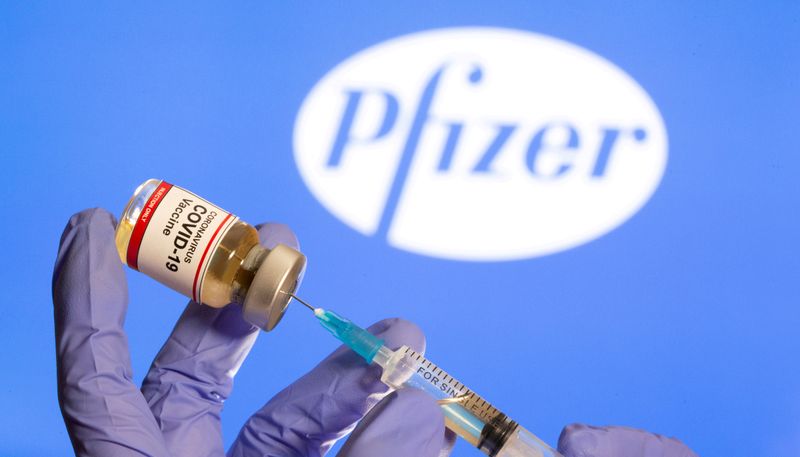By Alexander Winning and Wendell Roelf
JOHANNESBURG (Reuters) - Scientists will meet on Thursday to advise South Africa's government on its next steps after a study suggested the dominant local coronavirus variant may reduce protective antibodies from Pfizer (NYSE:PFE)'s COVID-19 vaccine by two-thirds.
The laboratory study, published in the New England Journal of Medicine, is another worry for the country hardest-hit by the pandemic on the African continent after it placed AstraZeneca (NASDAQ:AZN) vaccinations on hold earlier this month.
Although its implications on the real-world efficacy of Pfizer's vaccine are not yet clear, the study comes after clinical trial data on the AstraZeneca, Johnson & Johnson (NYSE:JNJ) (J&J) and Novavax (NASDAQ:NVAX) vaccines showed reduced efficacy against the more contagious 501Y.V2 variant, first identified late last year.
South Africa has been counting on the Pfizer shot, developed with German partner BioNTech, to step up its vaccination programme after administering the first J&J doses on Wednesday.
It is considering swapping or selling its AstraZeneca doses, after a small local trial, where participants were on average 31 years old, showed the vaccine offered minimal protection against mild to moderate illness caused by the 501Y.V2 variant.
Officials are more confident about the J&J shot because it was shown to be effective against severe illness in the local leg of a large global trial.
The study published on Wednesday took into account all key mutations of the 501Y.V2 variant. A paper published in late January assessed the impact of only three key mutations of the variant.
Scientists say that because the new study's findings come from a laboratory, it is not easy to extrapolate what they might mean in the real world.
Peter English, a consultant in communicable disease control, said it was "far from proven" that the Pfizer vaccine would be less effective against the 501Y.V2 variant. He said cellular immunity - as well as antibodies - was important in protecting against the virus and that scientists did not know the level of neutralising antibodies needed for immunity.
"Our scientists will be meeting to discuss it (the study) and they will advise the minister," health ministry spokesman Popo Maja said.
Barry Schoub, chair of the Ministerial Advisory Committee on vaccines, said the committee would discuss the study alongside information on other vaccines.
Asked to comment on the findings, he said: "The Pfizer vaccine is enormously effective at 95%, so even if there is quite a significant reduction there still will be quite a bit of remnant efficacy left.
"It is very likely that it will protect to a reasonable extent, certainly against severe illness and mild to moderate to some extent," he said.
"STRONG ENOUGH"
Richard Mihigo, an immunisation official at the World Health Organization's Africa office, told a news conference the antibody response to the variant in the Pfizer study was "strong enough".
Linda-Gail Bekker, co-lead investigator of the South African arm of J&J's global trial, said she would recommend rolling out the Pfizer vaccine but monitoring it in the same way as the J&J shot, which is being administered in an "implementation study" targeting up to 500,000 health workers to further test it.
Health Minister Zweli Mkhize said on Wednesday South Africa was expecting 500,000 doses of the Pfizer vaccine initially and about 7 million doses by June.
A spokesman for regulator SAHPRA said Pfizer's registration application was under review and declined further comment.
South Africa, with nearly 1.5 million cases and about 48,500 deaths, has recorded almost half the COVID-19 fatalities and over a third of confirmed infections in Africa. It lagged richer Western nations in launching its immunisation campaign.

The government plans to vaccinate 40 million people - two-thirds of the population.